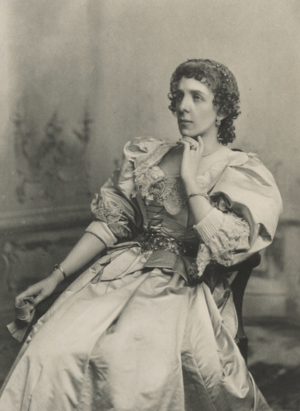Maud Palmer, Countess of Selborne facts for kids
Quick facts for kids
The Countess of Selborne
|
|
|---|---|

Beatrix Maud (née Cecil), Countess of Selborne in 1897 by Lafayette
|
|
| President of the Conservative and Unionist Women's Franchise Association | |
| In office 1910–1913 |
|
| Preceded by | Louisa Knightley |
| Succeeded by | Countess of Fingall |
| President of the National Council of Women of Great Britain & Ireland | |
| In office 1920–1921 |
|
| Preceded by | Maria Ogilvie Gordon |
| Succeeded by | Frances Balfour |
| Personal details | |
| Born |
Beatrix Maud Gascoyne-Cecil
11 April 1858 Marylebone, London, England |
| Died | 27 April 1950 (aged 92) |
| Political party | Conservative |
| Spouse |
William Palmer, 2nd Earl of Selborne
(m. 1883; died 1942) |
| Children | Mabel Grey, Countess Grey Roundell Palmer, 3rd Earl of Selborne Hon. Robert Palmer Hon. Lewis Palmer |
| Parents | Robert Gascoyne-Cecil, 3rd Marquess of Salisbury Georgina Alderson |
| Occupation | Activist |
Beatrix Maud Palmer, also known as the Countess of Selborne, was an important British activist. Born on April 11, 1858, she spent her life working for political causes and women's rights. She passed away on April 27, 1950.
Contents
Her Early Life
Beatrix Maud Gascoyne-Cecil was born in Marylebone, a part of London. She was the oldest child of Robert Gascoyne-Cecil, 3rd Marquess of Salisbury, who later became the Prime Minister of the United Kingdom. Her mother was Georgina Alderson.
Even though Maud didn't go to school in a formal way, she learned a lot about politics and the Conservative Party from her family. She also got involved with a local group called the Primrose League, which supported conservative ideas.
Fighting for Women's Rights
In 1883, Maud married William Palmer, who would later become the 2nd Earl of Selborne. William was a Member of Parliament. Even though he was part of the Liberal Party at first, Maud's strong Conservative views eventually influenced him. He later joined a group that worked closely with the Conservative Party.
From 1905, Maud and William lived in South Africa for a few years. While there, Maud helped with different local charities. When they returned to the UK in 1910, she became the president of the Conservative and Unionist Women's Franchise Association. This group worked to get women the right to vote.
Speaking Up for Women
As president, Maud traveled all over the country. She gave speeches to support women's suffrage, which is the right for women to vote. At first, she thought only wealthy single women should be allowed to vote. However, she later changed her mind and supported the idea of all married women being able to vote too. She believed that most married women would vote for conservative ideas.
Maud stepped down from her role in 1913. When World War I began, she focused her efforts on encouraging patriotism among people. After the war ended, she was less active in politics. However, she became a Justice of the Peace in Hampshire. This meant she helped with legal matters in her local area. She also served as the president of the National Council of Women of Great Britain & Ireland in 1920 and 1921.
Her Family Life
Maud and William Palmer had four children: three sons and one daughter.
- Lady Mabel Laura Georgiana Palmer (born 1884) married Charles Grey and had two daughters.
- Roundell Cecil Palmer (born 1887) became the 3rd Earl of Selborne after his father.
- Hon. Robert Stafford Arthur Palmer (born 1888) was a captain in the army and sadly died in 1916 during World War I.
- Hon. William Jocelyn Lewis Palmer (born 1894) married Dorothy Loder and had two children.
When William became the Earl of Selborne in 1895, Maud became the Countess of Selborne.
Her Legacy
Beatrix Maud Palmer's name and picture are honored on the base of the statue of Millicent Fawcett in Parliament Square, London. This statue was put up in 2018 to celebrate women who fought for the right to vote.
There is also a place near Pretoria in South Africa called Lady Selborne. It was named after her.

